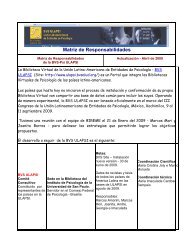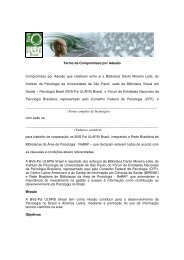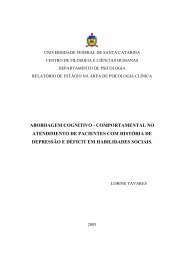Motivação no trabalho cooperativo - BVS Psicologia ULAPSI Brasil
Motivação no trabalho cooperativo - BVS Psicologia ULAPSI Brasil
Motivação no trabalho cooperativo - BVS Psicologia ULAPSI Brasil
You also want an ePaper? Increase the reach of your titles
YUMPU automatically turns print PDFs into web optimized ePapers that Google loves.
SAMPAIO, M. I. C. Motivation in cooperative work: the case of Psychology Libraries<br />
Brazilian’s network. 2005. 127p. Master Thesis – Communication and Arts School,<br />
University of São Paulo, São Paulo, 2005<br />
ABSTRACT<br />
Motivation has been highlighted in studies, among several areas of k<strong>no</strong>wledge, although is<br />
the Psychology, specially the Humanist Existential, that have found a large investigation<br />
field on that matter. As well, the cooperation has been gained relevance in social<br />
researches and in technical or conceptual discussions, as in action or <strong>no</strong>ticeable behavior<br />
fields. From that point this study tries to measure motivational factors found at the<br />
cooperative work of the Rede <strong>Brasil</strong>eira de Bibliotecas da Área de <strong>Psicologia</strong> – Rebap<br />
(Psychology Libraries Brazilian’s network), since the related librarians efforts have been<br />
assured the maintenance of the most important information source of the Biblioteca Virtual<br />
em Saúde – <strong>Psicologia</strong>, <strong>BVS</strong>-Psi (Health Psychology Virtual Library), intending the<br />
establishment of actions that could increase that cooperation. To k<strong>no</strong>w theoretical aspects<br />
from the searching were discussed several theories and concepts as: motivation and<br />
cooperation, got from literature. Beginning from those theoretical concepts, the study<br />
created analysis categories to match with librarians speeches gathered in Focus Groups<br />
(method choose for data gathering). The results show that the motivational and hygiene<br />
factors, determined by Herzberg, oriented to that study: Recognizing, Realization, Growing<br />
possibility, Responsibility, Job as itself, Job Conditions, Interpersonal relationship and<br />
Wage, were <strong>no</strong>ticed in the focus groups members speech and offer possibilities to<br />
implement actions that will contribute to the cooperation growth between ReBAP<br />
members.<br />
Key words: Motivation; Cooperation; Libraries Networks; Data Bases; Virtual Libraries.<br />
xiii

















